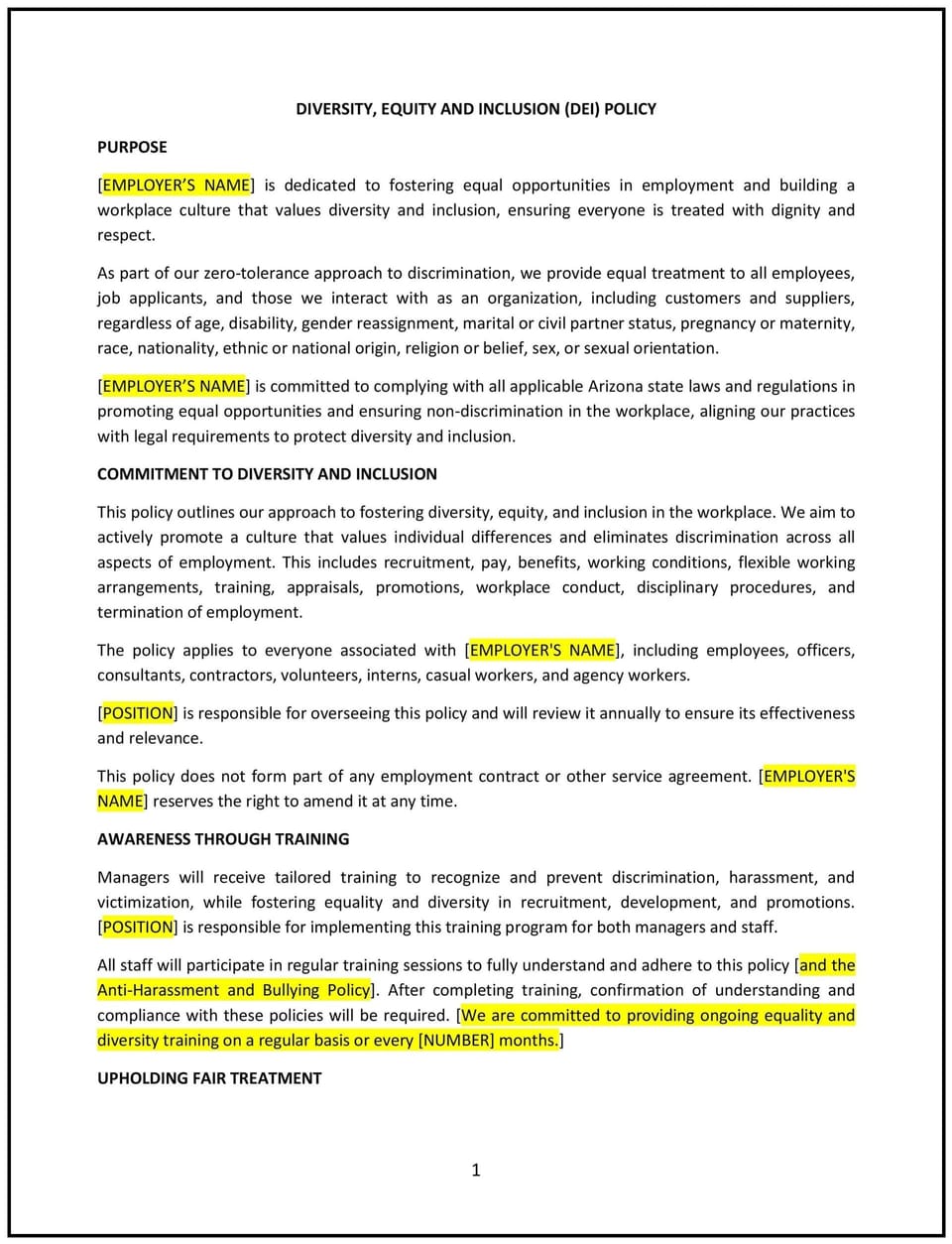Diversity, equity and inclusion (DEI) policy (Arizona): Free template

Diversity, equity and inclusion (DEI) policy (Arizona)
In Arizona, a diversity, equity, and inclusion (DEI) policy demonstrates a business’s commitment to fostering a workplace that values differences and promotes fairness and belonging. This policy provides a framework for creating equitable opportunities, addressing discrimination, and celebrating diversity in the workplace.
This policy outlines strategies for recruiting, retaining, and supporting a diverse workforce while establishing guidelines for education, accountability, and reporting concerns. By implementing this policy, Arizona businesses can build stronger teams, enhance innovation, and support compliance with federal and state laws.
How to use this DEI policy (Arizona)
- Define DEI objectives: Clearly articulate the business’s goals for promoting diversity, equity, and inclusion in the workplace.
- Establish recruitment strategies: Outline steps for attracting candidates from diverse backgrounds, such as inclusive job postings and outreach to underrepresented communities.
- Provide education and training: Offer ongoing training on unconscious bias, cultural competency, and anti-discrimination practices for employees and leadership.
- Create accountability mechanisms: Assign roles or committees to monitor DEI initiatives and ensure progress toward stated objectives.
- Include reporting procedures: Provide channels for employees to raise concerns about discrimination or inequities, with protections against retaliation.
Benefits of using a DEI policy (Arizona)
This policy offers numerous advantages for Arizona businesses:
- Strengthens workplace culture: Promotes a sense of belonging and collaboration among employees.
- Enhances innovation: Leverages diverse perspectives to drive creativity and problem-solving.
- Supports compliance: Aligns with Arizona’s anti-discrimination laws and federal regulations, reducing the risk of legal disputes.
- Attracts top talent: Positions the organization as an inclusive and forward-thinking employer.
- Improves retention: Demonstrates a commitment to fairness and equity, fostering loyalty and satisfaction among employees.
Tips for using a DEI policy (Arizona)
- Address Arizona-specific considerations: Reflect the state’s unique demographic and cultural diversity in DEI initiatives.
- Involve leadership: Ensure management actively participates in and supports DEI efforts, setting the tone for the organization.
- Use metrics: Track progress using measurable goals, such as increases in diverse hiring or participation in DEI training programs.
- Celebrate diversity: Organize events or initiatives that recognize and honor the cultural, ethnic, and social diversity of employees.
- Regularly review the policy: Adapt the policy as workplace dynamics, laws, or societal expectations evolve.
Q: How does this policy help attract diverse talent?
A: By creating an inclusive recruitment process and fostering a workplace culture that values diversity, the policy positions the organization as an employer of choice for candidates from all backgrounds.
Q: What training should be included under this policy?
A: Training should cover topics such as unconscious bias, cultural awareness, anti-discrimination practices, and inclusive leadership.
Q: How can businesses measure the success of DEI initiatives?
A: Use metrics such as diverse hiring rates, retention rates, and employee feedback from surveys to evaluate the effectiveness of DEI efforts.
Q: What protections are in place for employees who report discrimination?
A: The policy includes protections against retaliation, ensuring employees can safely report concerns and participate in resolving inequities.
Q: How does this policy support compliance with Arizona laws?
A: By addressing discrimination and promoting equity, the policy supports compliance with Arizona’s Civil Rights Act and related federal laws.
This article contains general legal information and does not contain legal advice. Cobrief is not a law firm or a substitute for an attorney or law firm. The law is complex and changes often. For legal advice, please ask a lawyer.


